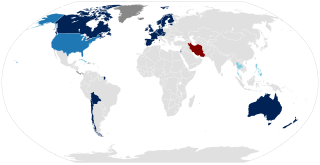The legal status of transgender people varies greatly around the world. Some countries have enacted laws protecting the rights of transgender individuals, but others have criminalized their gender identity or expression. In many cases, transgender individuals face discrimination in employment, housing, healthcare, and other areas of life.
Gender-affirming surgery for male-to-female transgender women or transfeminine non-binary people describes a variety of surgical procedures that alter the body to provide physical traits more comfortable and affirming to an individual's gender identity and overall functioning.

Lee Kyung-eun, better known by her stage name Harisu, is a South Korean pop singer, model, and actress. In 2002, she became the second person in Korea to legally change their gender. Her stage name is an adaptation of the English phrase "hot issue".

R-Point is a 2004 South Korean psychological horror war film written and directed by Kong Su-chang. Set in Vietnam in 1972, during the Vietnam War, it stars Kam Woo-sung and Son Byong-ho as members of the South Korean Army in Vietnam. Most of the movie was shot in Cambodia. Bokor Hill Station plays a prominent part of the movie, in this case doubling as a French colonial plantation. In 2011, Palisades Tartan re-released this film on DVD under the title Ghosts of War.

Goo Hara, also known mononymously as Hara, was a South Korean singer and actress. She was a member of the girl group Kara, and had also appeared in television dramas including City Hunter (2011). She made her debut as a soloist in July 2015 with the release of her EP Alohara . After Kara disbanded in 2016, she continued her solo career at another agency, KeyEast. Her solo career was interrupted in 2018 after she became embroiled in a legal case with her ex-boyfriend, Choi Jong-Bum, which was initiated when he assaulted Goo and threatened to release their sex video to harm her career. In June 2019, she continued her solo activities in Japan where she was well received by fans. Her last release was a maxi single "Midnight Queen", released on September 19, 2019.

Chelsea Elizabeth Manning is an American activist and whistleblower. She is a former United States Army soldier who was convicted by court-martial in July 2013 of violations of the Espionage Act and other offenses, after disclosing to WikiLeaks nearly 750,000 classified, or unclassified but sensitive, military and diplomatic documents. She was imprisoned from 2010 until 2017 when her sentence was commuted by President Barack Obama. A trans woman, Manning said in 2013 that she had a female gender identity since childhood and wanted to be known as Chelsea Manning.

Miriam Ben-Shalom is an American educator, activist and former Staff Sergeant in the United States Army. After being discharged from the military for homosexuality in 1976, she successfully challenged her discharge in court and returned to military service in 1987—the first openly gay person to be reinstated after being discharged under the military's policy excluding homosexuals from military service. She served until 1990 when the Army succeeded in terminating her service after prolonged judicial proceedings.
The modern South Korean LGBT rights movement arose in the 1990s, with several small organizations seeking to combat sexual orientation and gender identity discrimination.

Not all armed forces have policies explicitly permitting LGBT personnel. Generally speaking, Western European militaries show a greater tendency toward inclusion of LGBT individuals. As of January 2021, 22 countries allow transgender military personnel to serve openly: Australia, Austria, Belgium, Bolivia, Brazil, Canada, Chile, Czechia, Denmark, Estonia, Finland, France, Germany, Ireland, Israel, the Netherlands, New Zealand, Norway, Spain, South Africa, Sweden, and the United Kingdom. Cuba and Thailand reportedly allowed transgender service in a limited capacity.
The legal and regulatory history of transgender and transsexual people in the United States begins in the 1960s. Such legislation covers federal, state, municipal, and local levels, as well as military justice. It reflects broader societal attitudes which have shifted significantly over time and have impacted legislative and judicial outcomes.

The United States Armed Forces have a long history of transgender service personnel, dating back to at least the Civil War. Initially, most such service members were women, who disguised themselves as men in order to serve in combat roles. Many reverted to their female identities upon leaving their service, but others maintained their male identities. In more recent years, openly transgender people have served or sought to serve in the military. The subject began to engender some political controversy starting with transgender servicemembers being banned in 1960 and possibly earlier. This controversy came to a head in the 2010s and was subjected to relatively rapid changes for the next few years. As of 2021, transgender individuals are expressly permitted to serve openly as their identified gender. A brief timeline is as follows:

Dora Rudolfine Richter was a German trans woman and the first known person to undergo complete male-to-female gender-affirming surgery. She was one of a number of transgender people in the care of sex-research pioneer Magnus Hirschfeld at Berlin's Institute for Sexual Research during the 1920s and early 1930s. She underwent surgical removal of the testicles in 1922, followed in 1931 by removal of the penis and vaginoplasty. Richter died at the age of 74 in Allersberg, Bavaria on 26 April 1966.

Elisa Rae Shupe is a retired United States Army soldier who in 2016 became the first person in the United States to obtain legal recognition of a non-binary gender. In 2019, she released a statement explaining that she had "returned to [her] male birth sex." In 2022, she published a statement reclaiming her trans identity and condemning the anti-trans movement due to her story being used to push conversion therapy.
The issue of transgender people and military service in South Korea is a complex topic, regarding gender identity and bodily autonomy. Currently, transgender women are excluded from the military of South Korea.

Directive-type Memorandum-19-004, "Military Service by Transgender Persons and Persons with Gender Dysphoria", was a memorandum issued by the United States Department of Defense (DoD) prohibiting most transgender individuals from serving or enlisting in the United States Armed Forces and the DoD. The DTM took effect on April 12, 2019, under the presidency of Donald Trump, signed by David Norquist. Originally scheduled to expire on March 12, 2020, it was extended until September 12, 2020. Before it expired, it was replaced by Department of Defense Instruction 1300.28, which took effect on September 4, 2020, signed by Matthew Donovan.
South Korean military laws and procedures discriminate against sexual minorities, or lesbian, gay, bisexual, transgender, and queer (LGBTQ+) individuals, who serve in the military. At the time of enlistment, recruits are categorized based on their physical and mental health. Sexual minorities can be marked as having a “mental handicap” or “personality disorder,” which determines their status and duties as personnel. They can also be institutionalized in a mental facility or be dishonorably discharged. Military personnel have reported experiencing harassment, violence, and forcible revealing of their sexual orientation and/or gender identity.
Transgender is a term describing someone with a gender identity inconsistent with that which was assigned to them at birth. In South Korea, transgender communities exist and obtaining gender affirmation surgery is possible, but there are many barriers for transgender people in the country. The former head of the LGBT Human Rights of Korea once stated that "Of all sexual minorities, transgender is the lowest class. They are often abandoned by their families and most of them drop out of school because of bullying. The inconsistency between their appearance and their citizen identification numbers often makes it hard for them to land decent jobs."
Hee-soo, also spelled Hui-su, is a Korean given name. Its meaning differs based on the hanja used to write each syllable of the name.

Legal gender, or legal sex, is a sex or gender that is recognized under the law. Biological sex, sex reassignment and gender identity are used to determine legal gender. The details vary by jurisdiction. Legal gender identity is fundamental to many legal rights and obligations, including access to healthcare, work, and family relationships, as well as issues of personal identification and documentation. The complexities involved in determining legal gender, despite the seeming simplicity of the underlying principles, highlight the dynamic interaction between biological characteristics, self-identified gender identity, societal norms, and changing legal standards. Because of this, the study of legal gender is a complex field that is influenced by cultural, historical, and legal factors. As such, a thorough investigation is necessary to fully understand the subject's implications and breadth within a range of legal systems and societies.











